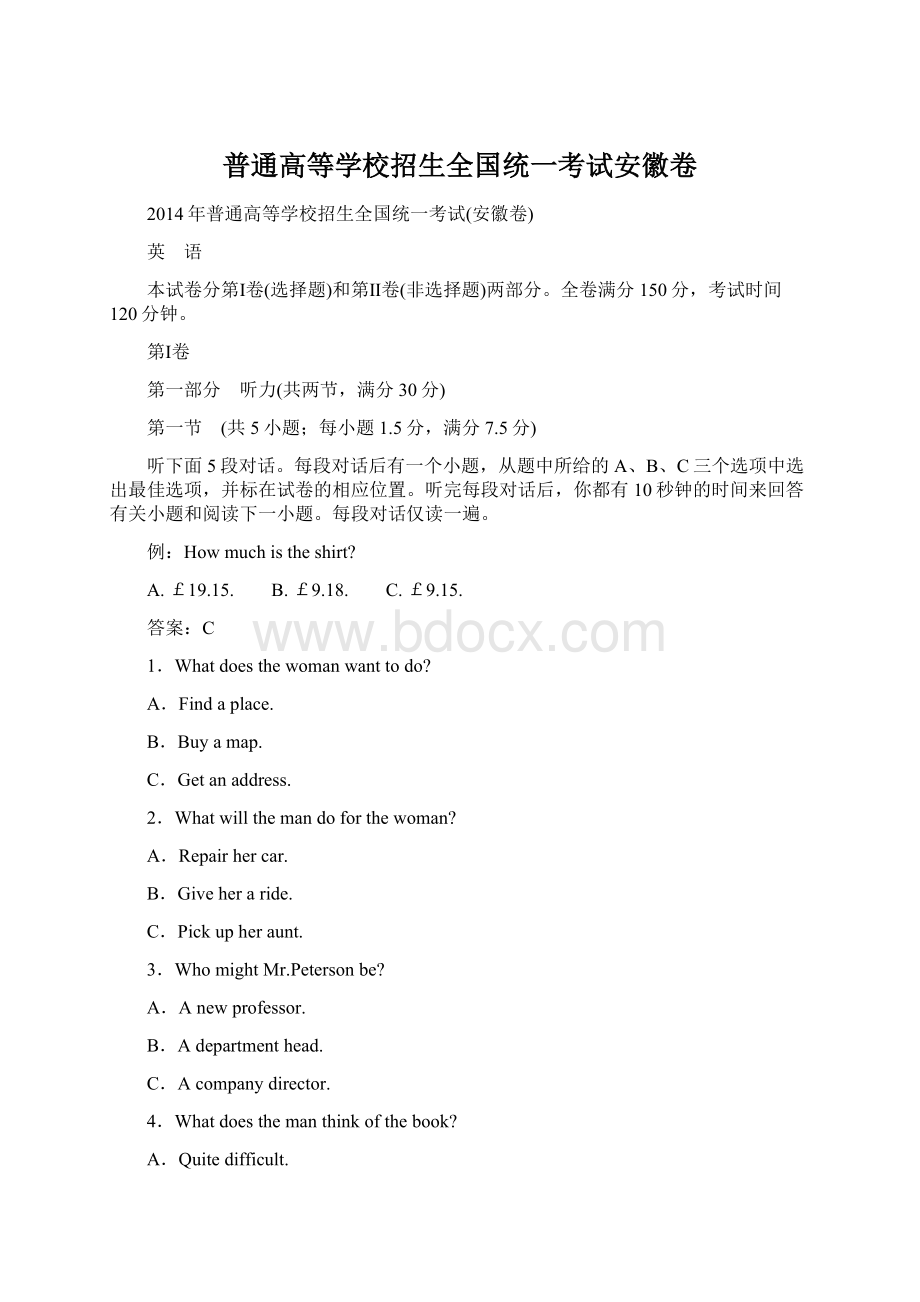普通高等学校招生全国统一考试安徽卷Word文档下载推荐.docx
《普通高等学校招生全国统一考试安徽卷Word文档下载推荐.docx》由会员分享,可在线阅读,更多相关《普通高等学校招生全国统一考试安徽卷Word文档下载推荐.docx(22页珍藏版)》请在冰豆网上搜索。

B.Buyamap.
C.Getanaddress.
2.Whatwillthemandoforthewoman?
A.Repairhercar.
B.Giveheraride.
C.Pickupheraunt.
3.WhomightMr.Petersonbe?
A.Anewprofessor.
B.Adepartmenthead.
C.Acompanydirector.
4.Whatdoesthemanthinkofthebook?
A.Quitedifficult.
B.Veryinteresting.
C.Toosimple.
5.Whatarethespeakerstalkingabout?
A.Weather.
B.Clothes.
C.News.
1~5 ABCBA
第二节 (共15小题;
每小题1.5分,满分22.5分)
听下面5段对话或独白。
每段对话或独白后有几个小题,从题中所给的A、B、C三个选项中选出最佳选项,并标在试卷的相应位置。
听每段对话或独白前,你将有时间阅读各个小题,每小题5秒钟;
听完后,各小题给出5秒钟的作答时间。
每段对话或独白读两遍。
听第6段材料,回答第6、7题。
6.WhyisHarryunwillingtojointhewoman?
A.Hehasapaininhisknee.
B.HewantstowatchTV.
C.Heistoolazy.
7.Whatwillthewomanprobablydonext?
A.Stayathome.
B.TakeHarrytohospital.
C.Dosomeexercise.
6~7 BC
听第7段材料,回答第8、9题。
8.Whenwillthemanbehomefromwork?
A.At5:
45.
B.At6:
15.
C.At6:
50.
9.Wherewillthespeakersgo?
A.TheGreenHouseCinema.
B.TheNewStateCinema.
C.TheUMECinema.
8~9 AC
听第8段材料,回答第10至12题。
10.HowwillthespeakersgotoNewYork?
A.Byair.
B.Bytaxi.
C.Bybus.
11.Whyarethespeakersmakingthetrip?
A.Forbusiness.
B.Forshopping.
C.Forholiday.
12.Whatistheprobablerelationshipbetweenthespeakers?
A.Driverandpassenger.
B.Husbandandwife.
C.Fellowworkers.
10~12 AAC
听第9段材料,回答第13至16题。
13.Wheredoesthisconversationprobablytakeplace?
A.Inarestaurant.
B.Inanoffice.
C.Inaclassroom.
14.WhatdoesJohndonow?
A.He'
satrainer.
B.He'
satourguide.
C.He'
sacollegestudent.
15.Howmuchcananewpersonearnforthefirstyear?
A.$10,500.
B.$12,000.
C.$15,000.
16.Howmanypeoplewillthewomanhire?
A.Four.
B.Three.
C.Two.
13~16 BCAC
听第10段材料,回答第17至20题。
17.Howlonghasthespeakerlivedinabigcity?
A.Oneyear.
B.Tenyears.
C.Eighteenyears.
18.Whatisthespeaker'
sopiniononpublictransport?
A.It'
scomfortable.
B.It'
stime-saving.
C.It'
scheap.
19.Whatisgoodaboutlivinginasmalltown?
ssafer.
shealthier.
smoreconvenient.
20.Whatkindoflifedoesthespeakerseemtolikemost?
A.Busy.
B.Colourful.
C.Quiet.
17~20 BCAB
第二部分 英语知识运用(共两节,满分45分)
第一节 单项填空(共15小题;
每小题1分,满分15分)
从A、B、C、D四个选项中,选出可以填入空白处的最佳选项,并在答题卡上将该项涂黑。
Itisgenerallyconsideredunwisetogiveachild______heorshewants.
A.however B.whatever
C.whicheverD.whenever
B
21.—Readingisthebestwaytopasstimeonthetrain.
—________.Inevergotravelingwithoutabook.
A.Youarejoking B.That'
strue
C.Idon'
tthinksoD.Itsoundslikefun
解析:
选B 考查交际用语。
句意:
“在火车上阅读是打发时间的最好方式。
”“的确如此。
我出行绝对不会不带书。
”第二个人说的话中“Inevergotravelingwithoutabook”使用的是双重否定,即为肯定,与第一个人说的话相照应,说明其对第一个人的话是赞同的,故选B。
22.Theexactyear________AngelaandherfamilyspenttogetherinChinawas2008.
A.whenB.where
C.whyD.which
选D 考查定语从句。
本题定语从句中的谓语动词spent为及物动词,缺少宾语,先行词为其宾语,故选用关系代词which。
23.Thetwins,who________theirhomework,wereallowedtoplaybadmintonontheplayground.
A.willfinishB.finish
C.havefinishedD.hadfinished
选D 考查时态。
已完成作业的双胞胎被允许到操场上打羽毛球。
根据语境可知,完成作业是在wereallowed之前发生的动作,属于“过去的过去”,应使用过去完成时。
故选D。
24.Youcanaskanyoneforhelp.________hereiswillingtolendyouahand.
A.OneB.Noone
C.EveryoneD.Someone
选C 考查不定代词。
你可以向任何一个人求助,这里的每一个人都愿意帮助你。
根据前一句“Youcanaskanyoneforhelp”可知,每一个人都愿意帮助你。
故选C。
noone为否定,不合题意;
one表示泛指;
someone指代某一个个体,均与前一句不符。
25.Themeaningoftheword“nice”changedafewtimes________itfinallycametoincludethesense“pleasant”.
A.beforeB.after
C.sinceD.while
选A 考查连词。
nice一词的含义变化了数次之后,最后它才包括了pleasant的含义。
根据finally可知,cametoincludethesense“pleasant”后于themeaningoftheword“nice”changedafewtimes发生,据此可排除B和C;
while引导时间状语从句时,主句的动作和从句的动作同时发生,可排除D。
故选A。
26.Terry,please________yourcellphonewhenGrandmaistalkingtoyou.
A.lookupfromB.lookinto
C.lookbackonD.lookthrough
选A 考查动词短语辨析。
Terry,祖母和你说话时,不要看你的手机。
lookupfrom“(在低头看某物时)抬头往上看”;
lookinto“调查,往里看……”;
lookbackon“回顾,回忆”;
lookthrough“检查,看穿”。
27.Mygoodperformanceinthejobinterviewleftme________aboutmyfutureandaboutwhatIcandohere.
A.puzzledB.sensitive
C.optimisticD.embarrassed
选C 考查形容词辨析。
我在求职面试中的良好表现让我对我的未来以及我可以在这里做什么持乐观的态度。
根据performance前的good可知应选optimistic,求职面试中表现好,自然就会对未来持“乐观、积极的”态度,而不是puzzled“困惑的”、sensitive“敏感的”或embarrassed“尴尬的”态度。
28.Whenthesportshero________atourparty,hewaswelcomedwithopenarms.
A.turnedupB.leftoff
C.movedonD.gotaway
当那位体育英雄出现在我们的聚会上时,我们张开双臂欢迎他。
turnup“出现,露面”;
leaveoff“停止”;
moveon“继续前进”;
getaway“逃离,离开”。
29.—Whynot